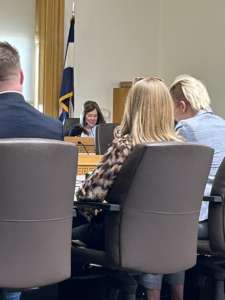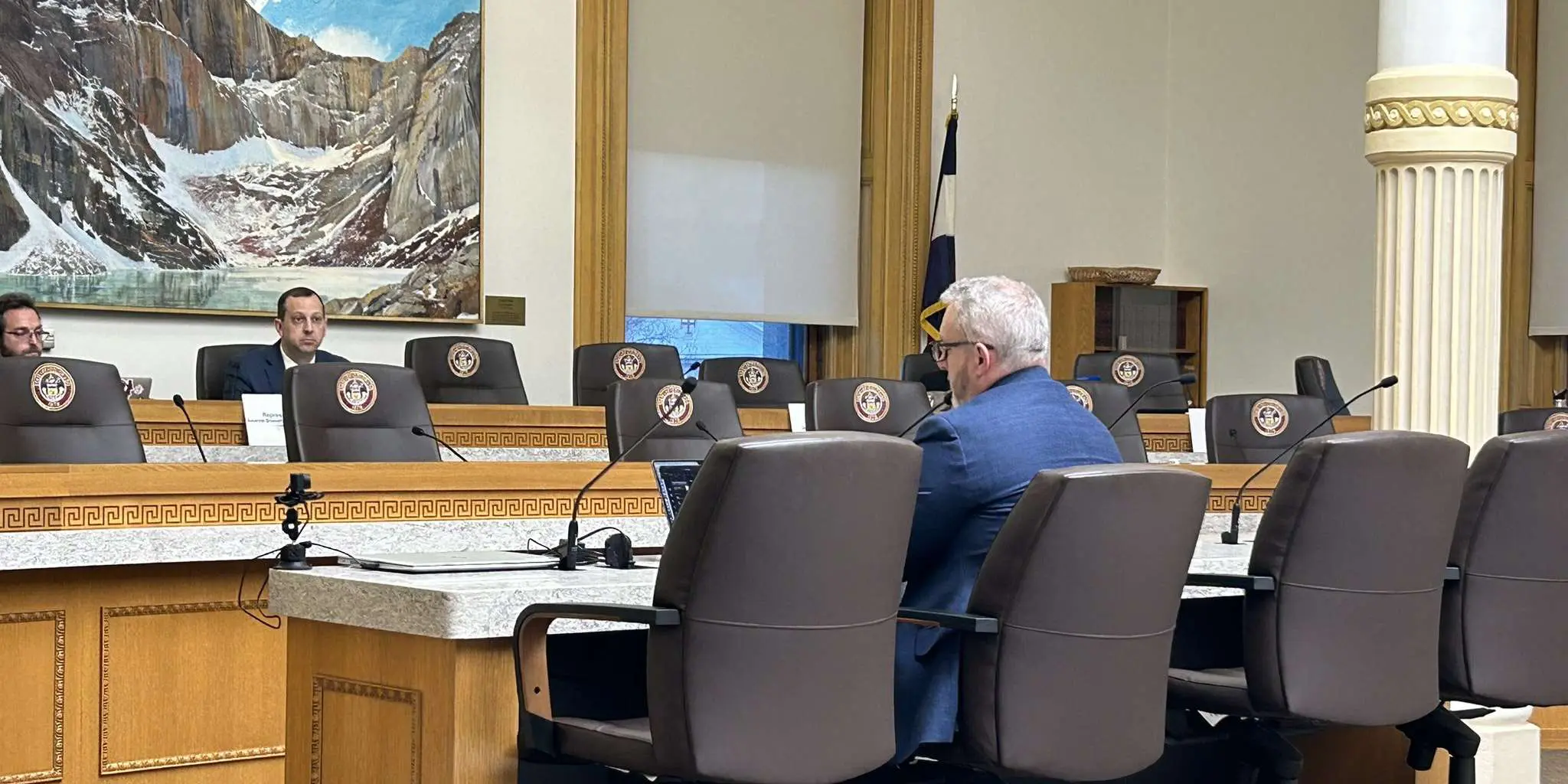This week, Democrat-controlled Colorado House committees voted down two proposed anti-abortion bills from state Rep. Scott Bottoms (R-Colorado Springs). Bottoms’ “Personhood of Living Unborn Human Child” bill was killed by the State, Civic, Military, & Veterans Affairs Committee, and his “Require Information about Abortion Pill Reversal” bill met the same fate in the Health and Human Services Committee.
“Personhood of Living Unborn Human Child” would have defined “person” to include a living unborn human child at any stage of development, starting from fertilization at the fusion of a human spermatozoon with a human ovum. The bill would have also allowed the prosecution abortion patients and providers for murder. The bill was supported by 12 other members of the Republican caucus, including Rep. Rose Pugliese (R-El Paso County), the House minority leader.
Bottoms’ bill had no exception for cases of rape or incest. “People that choose to murder a little baby should be held accountable legally,” he said during Monday’s committee hearing. “In the court system, they should be held accountable … Somebody that has been raped that goes to seek abortion is still choosing to murder a baby, regardless of how that baby came into conception. They’re still seeking to murder a baby.”
Rep. Jenny Willford (D-Northglenn) questioned Bottoms about the bill’s broad Republican support. “Have you had discussions to help [Republican sponsors of the bill] understand just how extreme it is, going as far as prosecuting, putting women in jail, for seeking abortion care, having miscarriages, as well as seeking health care in general,” she asked. “Would you say that this is a priority for your caucus?”
Bottoms declined to speak on behalf of his caucus. Opposition to the bill came from a broad collection of pro-abortion advocacy groups, including Cobalt, COLOR, and New Era Colorado.
“This is not the first time New Era has had to testify on a policy that would try to stigmatize people who choose to have an abortion in our state,” said Kiyana Newell, New Era’s policy manager. “I’m here to say again, that young people firmly believe in the right to access abortion without facing persecution or judgment for their autonomous decisions regarding their bodies. And that’s exactly what this piece of legislation seeks to do. I’m here to urge a no vote on this direct threat to bodily autonomy, House Bill 1224. In 2020, when our state was asked to vote by ballot on the egregious abortion ban that threatened bodily autonomy, Colorado voted it down. That year, our base shattered records, turning out to vote at 70% and making up 27% of the vote share. We’re not surprised. Ninety-six percent of the young people we spoke to support preserving abortion access for all. Then again, after the overturning of Roe, abortion consistently rose to the top of issues motivating young voter turnout, even in states like Colorado, where abortion wasn’t explicitly on the ballot. This is to say that we adamantly oppose the inclusion of provisions that would redefine personhood to include unborn human children at any stage of development. Such measures threaten to erode reproductive rights and endanger the bodily autonomy of individuals in our state.”
Bottoms was unswayed by the electoral failures of anti-abortion ballot measures. “When people let the majority rule on these kinds of issues, I think this is a dangerous thing,” he said. “We’re literally letting the majority say, ‘We’re going to take a group of humans and we’re going to kill them.’ In my opinion, that is the same thing that happened in Germany in World War II. There was more people that wanted to kill the Jews than people that stood up against it.”
Bottoms wasn’t the only one to invoke the Holocaust in comparison to abortion. “Blacks were owned as property in the United States in the 1800s,” said Will Duffy, president of Colorado Right to Life. “I highly doubt any member of this committee believes that they would have voted against personhood for blacks. Jews were murdered under the authority of the German government in the 1900s. I highly doubt any member of this committee believes they would have stood with the government in support of killing Jews. The reason you can’t find anyone today who admits they would have supported slavery and the Holocaust is because there’s no arguments to defend such a position. Does an argument exist that blacks are not the persons? Of course not. This argument exists that Jews are not human beings. Of course not. Yet here we are in the 2000s and human beings, baby, human beings, are being killed by the thousands here in Colorado and in states all over the country. Is there an argument to defend such a position?”
Other supporters of Bottoms’ bill included members of Brave Church, which has campuses in Denver and in Colorado Springs. “I’m here in support of this bill of abolition, and I want to be very clear to everyone here that I am not testifying to prove the fact that the life in the womb is a human being,” said Pastor Josiah Todaro. “Everybody in this room knows, beyond a shadow of a doubt, that the life in the womb is, in fact, a person. It’s a human being. What I’m testifying about today is that you guys are rebelling against the triune God of Scripture. Everybody in this room suppresses the knowledge of God in unrighteousness unless Christ redeems them.”
Progressive faith leaders spoke in opposition to the bill as well. “Interfaith Alliance of Colorado is an interfaith public policy advocacy organization that was started in 1998 by a group of five pastors who wanted to seek common values across faith traditions to represent in public policy,” explained Rev. Leta Behrens, a pastor with the Evangelical Lutheran Church in America. “We have over 400 congregations in our statewide network representing over two dozen faith traditions. Interfaith promotes justice, religious liberty, and understanding by building relationships in order to educate, advocate, and catalyze social change. So it is in this spirit that I advocate for a no vote. The bill would make any abortion a homicide. It would eliminate the freedom of access to fertility supports like IVF. It puts the life of the mother in grave danger and takes away the freedom to live and make choices in accordance with an individual’s religious faith and conscience, which is promised in our Constitution. There is not consensus on when life begins, and throughout the Gospels, Jesus says the two greatest commandments are to love the Lord your God and to love your neighbor as yourself. This bill prevents the freedom to fulfill the command to love one another, to take care of those who are in our community. Politicians should not impose one set of personal beliefs in order to make abortion care illegal. Faith is not monolithic, and laws that are designed based on one faith are discriminatory for everyone. Laws based in fact and in data and in our diverse communities, remains the most equitable system of ensuring that faith communities and all are honored.”

Rep. Brandi Bradley (R-Littleton) said Bottoms’ bill would provide “accountability” for people engaging in recreational sexual activity. “I read a study, a five-year study on abortions and the reasons given,” she said. “Not financially prepared. Not a good time. Issues with partner. Need to focus on their other children. Interferes with future plans. Not emotionally and mentally prepared. Health issue. Unable to provide a good life. Not independent or mature enough. Influence from family and friends. Don’t want children. The same study shows that less than 1% of women disclose their reason for having an abortion is rape or incest. I think you have to be very careful when we make that seem like that’s the common reason for abortion, when it’s the least common reason for abortion. I think that people should have accountability. If they’re going to have sexual relations, they should understand the consequences. If they’re financially not available or ready, they have other children and I’m sure Planned Parenthood will give them free birth control and condoms. There’s no accountability in this state anymore, and children end up paying the price. Unborn children.”
Ultimately, the bill was voted to be postponed indefinitely. “This bill is extreme,” said Willford. “It’s totally out of touch with Colorado voters. Since the bill wasn’t fully explained at the start of committee, I want to take a moment to make sure that we are all clear on what we are voting on. This bill before us tonight bans abortion with no exceptions, not to save the life of a pregnant person. Not for cases of rape, not for incest. If abortion care is sought out, the pregnant person can be charged with first-degree murder and sent to jail. If a pregnant person experiences a miscarriage or ectopic pregnancy under circumstances, they can be criminally prosecuted. This bill would criminalize IVF providers and essentially ban IVF in our state. And what’s worse is that 13 out of the 19 Republican caucus members have added their names to this bill. Let’s be clear, bills like 1224 do nothing to protect people’s health or well-being. It has absolutely nothing to do with accountability because it was never about accountability. It’s about controlling pregnant people’s bodies.”
Bottoms, Bradley, and Rep. Ken DeGraaf (R-Colorado Springs) voted in support of the bill.

Bottoms’ “Require Information about Abortion Pill Reversal” met a similar fate during its committee hearing Tuesday. The bill would have required a physician or other qualified medical professional assisting a physician to provide state-prepared information concerning abortion pill reversal, and mandated a 24-hour waiting period to access medication abortion.
Medication abortions consist of two medications — mifepristone, which blocks the body’s production of progesterone, stopping the pregnancy from progressing, and misoprostol, which causes the uterus to expel the aborted material. Abortion pill reversal is essentially doses of progesterone to counteract the effects of mifepristone for patients who have not yet taken misoprostol.
Democrats and abortion advocates argue that abortion pill reversal is not supported by medical science, and in August the Colorado Medical Board found that abortion pill reversal is outside the “generally accepted standard of practice.”
Bradley questioned opponents of the bill, comparing the use of progesterone in abortion pill reversal to gender-affirming health care.
“We give sex hormones and puberty blockers to children all the time that haven’t been mandated,” she claimed. “It’s the same thing. Progesterone is used in those, just like it’s used in women. It’s not okay for women to keep their babies but it’s okay to undergo transition when that’s not been proven safe. Progesterone is used in both cases. I want somebody to tell me why it’s okay to be used in children, but not okay for it to be used with a woman who wants to save a pregnancy, and that is choice as well … I’m wondering why we can use experimental puberty blockers, like progesterone, in children transitioning, and we say it’s safe, but for women who want to save their baby it becomes unsafe?”
Progesterone is not a puberty blocker, and has not historically been used for gender-affirming health care. Although its use has increased in recent years, use of progesterone for transition varies from provider to provider.
According to the American College of Obstetricians and Gynecologists, “A 2012 case series reported on six women who took mifepristone and were then administered varying progesterone doses. Four continued their pregnancies. This is not scientific evidence that progesterone resulted in the continuation of those pregnancies. This study was not supervised by an institutional review board (IRB) or an ethical review committee, required to protect human research subjects, raising serious questions regarding the ethics and scientific validity of the results. Case series with no control groups are among the weakest forms of medical evidence. Subsequent case series used to support use of medication abortion reversal have had similar limitations, including no ethics approval, no control group, under-reporting of data, and no reported safety outcomes. A 2020 study intending to evaluate medication abortion reversal in a controlled, IRB-approved setting was ended early due to safety concerns among the participants.”
The safety concerns in the 2020 study involved three women who experienced vaginal hemorrhaging and needed to be taken to the emergency room. One woman needed a blood transfusion.
“We don’t have any evidence that disproves the possibility that abortion reversal exists,” said Mitchell Creinin, the study’s lead researcher, to Vice in 2019. “But I do have evidence that not completing the regimen as it’s designed is dangerous.”
Bottoms framed the bill as giving abortion patients a choice to continue the pregnancy. “It does come down to whether you believe in a woman having the right to choose, or just being told one story,” said Bottoms. “This is just trying to give women the actual information and then giving her the opportunity to make that decision unfettered by the controls.”
The bill was postponed indefinitely by a 9-4 vote. “I just want to state for the record that the Colorado Medical Board, who oversees the medical profession in our state, has ruled that the ‘abortion pill reversal process’ is not generally accepted standard of care,” said Rep. Karen McCormick (D-Longmont), a doctor of veterinary medicine. “That’s really, really important for us to remember. I was elected to come to this position to use my critical thinking skills and my study of medicine and pharmacology and can in no way support this bill.”
Bradley, Rep. Richard Holtorf (R-Akron), Rep. Ron Weinberg (R-Loveland), and Rep. Mary Bradfield (R-Fountain) voted in support of the bill.




